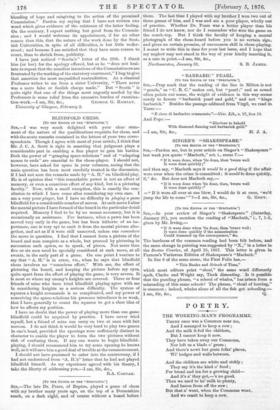BLINDFOLD CHESS.
[TO THE EDITOR OF THE SPECTATOR:] SIR,-1 was very much delighted with your clear state- ment of the nature of the qualifications requisite for chess, and with the acute remarks contained in the letters of your two corre- spondents. Though I agree with most of your article, I think that Mr. J. C. A. Scott is right in asserting that judgment plays a considerable part in enabling a fine player to gain his battles. Both the power of "grasping space-relations" and of "adapting means to ends" are essential to the chess-player. I should not, however, have asked for space in your columns, seeing that the main question has been most carefully treated in the discussion, if I had not seen the remarks made by "A. H." on blindfold play. He is of opinion that "this remarkable power is not an effort of memory, or even a conscious effort of any kind, but is a picturing faculty." Now, with a small exception, this is exactly the con- clusion to which I have come after considering my own case. I am a very poor player, but I have no difficulty in playing a game blindfold for a considerable number of moves. At each move I alter the mental picture I have formed of the board in the particular detail required. Memory I find to be by no means necessary, but it is occasionally an assistance. For instance, when a pawn has been moved very early in the game, but has been hitherto of no im- portance, one is very apt to omit it from the mental picture alto- gether, and act as if it were still unmoved, unless one remembers the move in question. I find that I cannot form a picture of the board and men complete as a whole, but proceed by picturing in succession each system, so to speak, of pieces. Not more than five or six men need be specially considered at each move, at all events, in the early part of a game. On one point I venture to say that "A. H." is in error, viz., when he says that blindfold chess involves no "conscious effort." With me, the effort of picturing the board, and keeping the picture before my eyes, quite apart from the effort of playing the game, is very severe. It is most so where my enemy's knights are covered. Three or four friends of mine who have tried blindfold playing agree with me in considering knights as a serious difficulty. The system of squares a knight commands is so complicated, and my power of conceiving the space-relations his presence introduces is so weak, that I have generally to count the squares to get a clear idea of how he affects my position.
I have no doubt that the power of playing more than one game blindfold could be acquired by practice. I have never tried myself, but a friend of mine can carry on two at once with fair success. I do not think it would be very hard to play two games in one's head, provided the openings were sufficiently distinct in character to enable the player to form the two pictures without risk of confusing them. If any one wants to begin blindfold- playing, I should recommend him to try some opening he knows well, as it will save him a good deal of trouble at the commencement.
I should not have presumed to enter into the controversy, if I had not understood from "A. H.'s" letter that he had not played blindfold himself. As my experience agreed with his theory, I take the liberty of addressing you.—! am, Sir, &c.,
B.A. CANTAB.


































 Previous page
Previous page